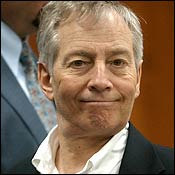
Despite Robert Durst’s admission that he bow-sawed his neighbor’s corpse into pieces before dumping it into Galveston Bay, a Texas jury found him not guilty of murder. We sought some legal advice.
Did the verdict surprise you?
GERALD SHARGEL, defense attorney: Everyone, including Durst, was surprised.
WENDY MURPHY, law professor and former prosecutor: Sometimes common sense gets trumped by other things. Jurors come to the table less inclined to believe that someone like Durst is capable of such hideous violence—he’s Middle America’s next-door neighbor and then some.
RON FISCHETTI, defense attorney: It points to the fact that you can’t judge a case by what you read in the papers.
What did you think of the prosecution’s case?
MURPHY: It was strong in an objective sense. The head of the body wasn’t there, and when the head is missing, you hold that against the killer—not the state.
FISCHETTI: It covered all the bases, and their cross-examination was excellent.
SHARGEL: The O. J. Simpson acquittal could be explained by the ineptness of the prosecutors, but this is a very different case. I think the prosecutors put on a good case, but this was just a matter of being outlawyered.
What about the defense’s case?
FISCHETTI: They had to make the critical decision to put Durst on the stand and have all the cross-dressing, the jumping bail, the dismemberment come out. Without an insanity plea, it was a very bold move.
SHARGEL: The absolutely brilliant thing the defense did was take every disadvantage and turn it into an advantage. The defense lawyer argued that Durst was in Texas because an unfair, relentless prosecutor in New York was chasing him for no reason. The defense had the inventiveness and boldness to put it all before the jury.
MURPHY: The defense did a very good job of telling the jury not to judge Durst because he freaked out after he accidentally killed someone and chopped up the body. And they gambled—they said, “Either send this guy to prison for life or let him go free,” instead of asking for manslaughter. That hurts the public’s interest in seeing the right result.
Did the jury make the right decision?
MURPHY: He literally hid the body in the most grotesque form imaginable. It’s so cold-hearted, it’s consistent with the mind of a person that could kill.
SHARGEL: If I was on the jury, I might have voted the same way.
FISCHETTI: This is not some sort of scientific finding of guilt or innocence. They’re not saying he was innocent. They’re saying that with what they were given for proof, it wasn’t done.